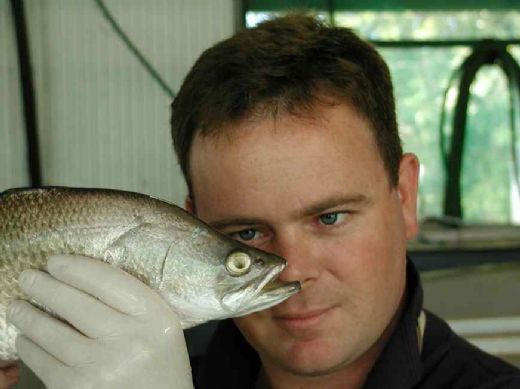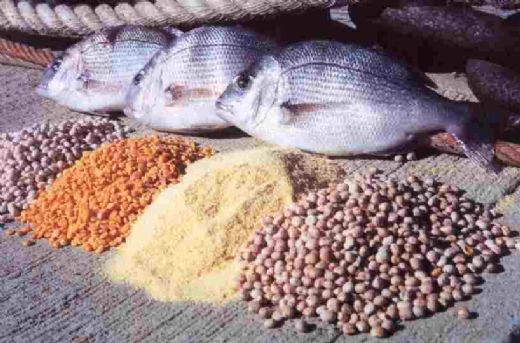Interview to Brett Glencross:"There is NO requirement for fishmeal or fish oil in the diet of any aquatic species"
Published: February 1, 2010
By: Engormix.com
Dr. Brett Glencross completed an Undergraduate Degree with a triple major in Biochemistry-Molecular Biology-Zoology, then did and Honours Degree in Biochemistry, and started a PhD on Pig Nutrition, but changed that to a MSc so he could start a new PhD on something that he was REALLY interested in: fish nutrition

Which is the most debated issue nowadays in Aquaculture Nutrition?
The future of fishmeal and fish oil replacement - what can be replaced and what can't, what alternatives offer the most prospect and why.
The future of fishmeal and fish oil replacement - what can be replaced and what can't, what alternatives offer the most prospect and why.
A lot of researchers, industry and academics get caught up with not understanding this issue properly. There is NO requirement for fishmeal or fish oil in the diet of any aquatic species, it just happens to be that fishmeal and fish oil are very cost effective sources of nutrients and energy. HOWEVER - they do have some unique nutrients like taurine and nucleotides that are not found in many other raw materials and these need to be considered when defining diet specifications for aquatic species. The inclusion of omega-3 too is another one. Actual requirements for long-chain omega-3 are pretty low, but their inclusion in the diet of these animals has an important role in the product quality attributes of the food(fish) being produced.
Which are the latest advances in your field?
There are a range of really novel and practical advances in the field, including;
1. The use of NIRS to predict not only traditional crude composition features, but more in depth multivariate approaches that allow it to be used to define digestible nutrient and energy values of raw materials and complete diets. The pig and poultry sectors have made some inroads into this too - but the fish sector has some "break-throughs" on the horizon in this area.
2. The development of next generation transgenic oil crops with long-chain omega-3 content
3. The development of bioreactor technologies that see the large-scale production of bacterial and algal derived proteins and oils.
4. The application of bioactive substances to aquatic animal feeds to enhance both animal health and productivity.
5. The application of nutrigenomics to discover what genes are responding to what nutrients, when and why. This has the potential to open up some really interesting advances in mechanistic model development for nutritional/biological systems.
There are a range of really novel and practical advances in the field, including;
1. The use of NIRS to predict not only traditional crude composition features, but more in depth multivariate approaches that allow it to be used to define digestible nutrient and energy values of raw materials and complete diets. The pig and poultry sectors have made some inroads into this too - but the fish sector has some "break-throughs" on the horizon in this area.
2. The development of next generation transgenic oil crops with long-chain omega-3 content
3. The development of bioreactor technologies that see the large-scale production of bacterial and algal derived proteins and oils.
4. The application of bioactive substances to aquatic animal feeds to enhance both animal health and productivity.
5. The application of nutrigenomics to discover what genes are responding to what nutrients, when and why. This has the potential to open up some really interesting advances in mechanistic model development for nutritional/biological systems.

How do you see Aquaculture in Australia and the world in 2010?
Global production in 2010 of aquaculture produce will clearly supercede the production from wild-harvest fisheries. The relevance of wild-harvest fisheries will begin to wane and the market will become more accepting of aquaculture produce as the norm as wild-fishery product continues to get more expensive (and less profitable).
Global production in 2010 of aquaculture produce will clearly supercede the production from wild-harvest fisheries. The relevance of wild-harvest fisheries will begin to wane and the market will become more accepting of aquaculture produce as the norm as wild-fishery product continues to get more expensive (and less profitable).
In Australia there will be steady growth in the salmon, prawn, oyster/mussel and barramundi sectors but the others will struggle. Mainly because these sectors have a solid domestic market base and a competive edge over potential import competition, while the others rely heavily on exports. With the Australia dollar remaining strong - its difficult for our traditional export seafood markets like Japan, USA and China to pay the price required.
Do you have any academic experience that marked you in your career?
Originally I wanted to be a marine biologist, but when I started studying biochemistry and discovered "it all made sense" to me and that I had a flair for it, things began to change. About the same time the marine biology content at the university where I was largely restricted to marine ecology - which was about as exciting as reading the telephone book ! I had a penchant for being practical and using what I learnt to make changes - actively ! So the combination of an interest in marine life, a flair for biochemistry and a childhood growing up in farming regions with an Agricultural Scientist father led me to aquaculture, which sort of allows me to combine all this.
Originally I wanted to be a marine biologist, but when I started studying biochemistry and discovered "it all made sense" to me and that I had a flair for it, things began to change. About the same time the marine biology content at the university where I was largely restricted to marine ecology - which was about as exciting as reading the telephone book ! I had a penchant for being practical and using what I learnt to make changes - actively ! So the combination of an interest in marine life, a flair for biochemistry and a childhood growing up in farming regions with an Agricultural Scientist father led me to aquaculture, which sort of allows me to combine all this.
Do you have some advice for the academic community?
There is a real problem with much of the academic community in that they operate in large degree of isolation from the rest of society. There is a need for academics to consolidate resources and courses (for example in Australia we have about 10 universities teaching aquaculture and none of them have the effective critical mass to do it properly - so the national capability suffers due to this fractionation. Especially for an industry worth only ~$1billion and for a nation of 22million). Ideally the academics need to liaise more with the industry and non-academic research sectors to help create this critical mass. In addition, none of the universities have any real useful R&D facilities in this area, so without this broader engagement the relevance of what they're doing is also questionable. However so long as the main metric on which scientists are judged remains their number of publications - then none of this is going to change quickly. Its easier to produce lots of papers with a pipette and PCR machine than actually doing things on farm.
There is a real problem with much of the academic community in that they operate in large degree of isolation from the rest of society. There is a need for academics to consolidate resources and courses (for example in Australia we have about 10 universities teaching aquaculture and none of them have the effective critical mass to do it properly - so the national capability suffers due to this fractionation. Especially for an industry worth only ~$1billion and for a nation of 22million). Ideally the academics need to liaise more with the industry and non-academic research sectors to help create this critical mass. In addition, none of the universities have any real useful R&D facilities in this area, so without this broader engagement the relevance of what they're doing is also questionable. However so long as the main metric on which scientists are judged remains their number of publications - then none of this is going to change quickly. Its easier to produce lots of papers with a pipette and PCR machine than actually doing things on farm.
Source
Engormix.comRelated topics:
Authors:
CSIRO
Recommend
Comment
Share

Would you like to discuss another topic? Create a new post to engage with experts in the community.




